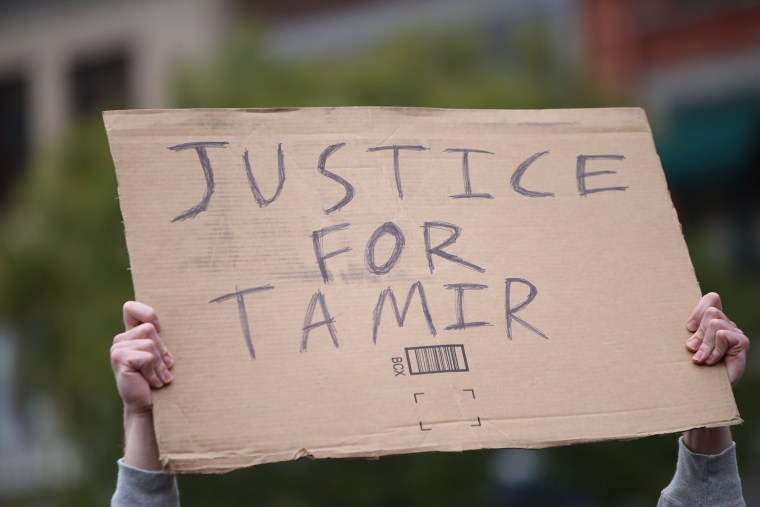How much is a black boy’s life worth?
In the case of 12-year-old Tamir Rice, $6 million. That’s how much the city of Cleveland has agreed to pay to settle a wrongful death lawsuit brought by the boy’s family.
Six million dollars for the city to avoid ever having to admit any culpability in Tamir’s death at the hands of a rookie cop with questionable qualifications back in 2014.
Six million to duck the possibility of a federal civil rights trial and what could have been an even costlier payout.
Six million to cool the anger over the execution of a child whose crime was packing a pellet gun in his waistband.
Six million for a black boy’s life.
RELATED: City of Cleveland settles Tamir Rice lawsuit for $6 million
The settlement was announced on Monday morning, several months after a grand jury declined to bring charges against officers Timothy Loehmann, the shooter, and Frank Garmback, who skidded the pair’s police cruiser into a park and within feet of Tamir before Loehmann opened fire. The first of the shots came as Loehmann flung open his door and before the cruiser came to a full stop.
Tamir’s death by police gunfire is one of many to unleash a wave of anger, protests and, at times, violence over what activists contend are the vestiges of racism that have systematically devalued and destroyed black life.
His killing came just two days before a grand jury in Ferguson, Missouri, decided not to charge a police officer there who fatally shot Michael Brown, an unarmed 18-year-old killed under questionable circumstances that summer.
The Rice family’s wounds have time and again been salted by the city and state officials. When the city responded to family's lawsuit last year, it did so by seeming to blame Tamir for his own death. The Cleveland mayor eventually apologized and tweaked the language of the city’s filing. Earlier this year, in February, the city took legal action of its own, suing Tamir’s family for the $500 ambulance ride that carried his dead body from the scene of the shooting. Once again, the city later reversed course.
A probate court must still approve the pending agreement between the city and the family. As part of the settlement, Cleveland does not admit wrongdoing.
“In a situation such as this, there is no such thing as closure or justice. Nothing will bring Tamir back,” lawyers for Rice’s family, with the New York City-based firm Emery Celli Brinckerhoff & Abady, said in a statement released on Monday. “His unnecessary and premature death leaves a gaping hole for those who knew and loved him that can never be filled.”
The settlement in Tamir’s case is the latest in a string of payouts by cities to the families of loved ones, mostly unarmed and all black, who’ve been killed by police officers or died in police custody.
Eric Garner in New York City: $5.9 million for being choked to death by officers while allegedly selling loose cigarettes. Freddie Gray in Baltimore: $6.4 million for having his neck snapped while being taken on a rough ride in the back of a police van. Walter Scott in North Charleston, S.C.: $6.5 million for being shot eight times, five in the back, by an officer after Scott fled a traffic stop for having a broken brake light.
LaQuan McDonald in Chicago: $4.5 million for being shot and killed as he tried to walk away from a confrontation with police who trailed him down a street. Many of these families and countless others affected by police violence in one way or another would gladly take criminal prosecution or some form of “justice”— elusive as that concept may be— over a payout.
Yet, even in financial terms, these settlements are dwarfed by the dollar amounts handed out in other high-profile lawsuits don't involve the kind of violence, bloodshed or death we’ve seen in case after case of questionable killings by police.
Sports reporter Erin Andrews was recently awarded $55 million by a jury after a man videotaped her nude through a peephole at a hotel and later released the video on the internet.
Pro-wrestling legend Terry “Hulk Hogan” Bollea was awarded $140.1 million last month in a lawsuit against media giant Gawker for its posting of a sex tape involving Hogan and his best friend’s wife. So, how much is a black boy’s life worth? To Tamir Rice’s family, it’s priceless.
“Although historic in financial terms, no amount of money can adequately compensate for the loss of a life,” the Rice family’s lawyers said. “Tamir was 12 years old when he was shot and killed by police — a young boy with his entire life ahead of him, full of potential and promise.”
